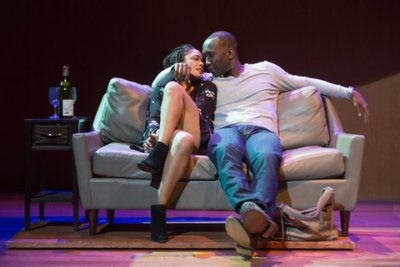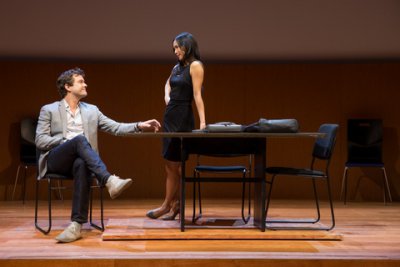Smart People
Uneven but clever and witty satire on racial and sexual politics from the author of Broadway’s “Stick Fly.”
[avatar user=”Victor Gluck” size=”96″ align=”left” ] Victor Gluck, Editor-in-Chief[/avatar]Smart People, the latest play from Lydia R. Diamond (Stick Fly) now at Second Stage Theatre, is a satire on racial and sexual politics which seems to be the playwright’s chosen territory. An uneven but clever and witty satire, Smart People is played by a quartet of talented and attractive performers who bring the characters vividly to life under the direction of Kenny Leon who has become the go-to guy for Broadway productions of important plays by African American authors (Lorraine Hansberry, August Wilson, Katori Hall, Lydia R. Diamond). While the first act does not reveal where the play is going, the second act makes up for its earlier flaws.
The play covers the period from September 2007 up to Inauguration Day, January 20, 2009, during Obama’s run for president. In the opening scene, we are introduced to four articulate and intelligent people connected to Harvard University and living and working in the Cambridge area. Valerie Johnston, a 24-year-old African American Harvard grad with an MFA, is rehearsing in a local production of Julius Caesar. Brian White, a thirtyish Caucasian, tenured professor at Harvard, a neuro-psychiatrist, studying patterns of racial identity and perception, is lecturing to a class of undergraduates. Ginny Yang, a thirtyish Chinese-Japanese American who is a tenured professor of psychology at Harvard studying race and identity among Asian American women, is giving a lecture to peers. Jackson Moore, aged 28, is an African American surgical intern at Harvard Med School on rotation, being dressed down by a superior.
The play takes place mostly in two-character scenes. Brian and Ginny meet at a meeting of the “Committee for the study of minority matriculation, retention, and recruitment” where she recognizes him as the department golden boy who wrote an Op-Ed article on race that started a fire storm. He is attracted to her combativeness and quick wit and asks her out for dinner. Valerie meets Jackson when she goes to the emergency room after an accident on the set during rehearsal. He suggests that she come to his after work clinic but includes his personal number on the back of the card, hoping she will call him for dinner. We discover that Brian and Jackson know each other when we find them changing in the locker room after a vigorous game of two-man basketball.
Like the concept of “six degrees of separation,” the four characters keep running into each other: Valerie becomes Brian’s research assistant, and Ginny goes to Jackson’s clinic to ask to use his patients for her study on Asian American women. Like Ayad Aktar’s Disgraced (also about race), a climactic scene brings them all together for a dinner party to deal with the fallout of their lives, the state of race relations in America today, and their place in it.
The satire begins early: it turns out that although the department likes having Brian doing his research proving that whites are genetically racist, they are not happy with his conclusions. Although Jackson may be the smartest doctor in the room, he has trouble working with others and bending to authority on the job. Although Valerie has a Harvard degree, she cleans houses to pay her rent which ticks off her upper middle-class mother. However, she is not pleased when she attends an audition for “Mary, the social worker” and is asked instead to read for the part of “Shlonda” from the ‘hood. Ginny finds that her therapy clients perceive her as white, but she knows that in the talk of race in America, she is invisible as race is defined as between blacks and whites in modern discourse.
Much of the pointed barbs are hilarious: Valerie assumes Jackson is an orderly when she meets him in the E.R. just as he thinks that she has been assaulted by her boyfriend. Brian gets a kick out of saying, “White men can jump” when he wins at basketball, but is taken aback when he asks Jackson if he let him win and is told by this “powerful specimen of athletic Black manliness”: “Look at me.” However, the crosscutting between scenes as well as the many short, quick two-character encounters staged on different parts of the large stage suggest that this will be better as a movie, as do the many one-sided conversations with unseen characters. While the first act doesn’t give a clue to where the play is going and seems rather scattershot, the second act sharply focuses the author’s message on race. Much of the sociological talk sound like psycho-babble, and it is not clear whether this is meant to be funny or not. Of course, it is possible that the facts and figure which are hard to follow are absolutely true science.
The cast who are best known for television and film could not be better. As Jackson who has a chip on his shoulder but is unbeatable in his special fields, Mahershala Ali (Chief of Staff Remy Danton on Netflix’s House of Cards) is dynamic, yet brooding. Anne Son, a regular on the ABC drama series, My Generation, makes Ginny a feisty, hard-hitting and opinionated modern woman. Tessa Thompson’s Valerie is an amusing collection of contradictions from upper-class manners to false values, eager to please but not happy with what she is asked to do. Joshua Jackson, (Cole Lockhart on Showtime’s The Affair), has the most difficult role as the white research scientist who appears to have little self-knowledge but a great deal of facts at his fingertips. While this may be part of Diamond’s satire, his role and our reaction to it are indistinct rather than clear. However, as directed by Leon, the cast is always believable as recognizable type A personalities.
Aside from bringing in various set pieces for the majority of the scenes on stage wagons, Riccardo Hernandez’s setting suggests a lecture hall with its large screen which is at times distracting. The costumes by Paul Tazewell are spot-on for these upwardly mobile modern Bostonians. Both Jason Lyons’ lighting design and Nevin Steinberg’s sound design are subtly suitable for the action of the play. The original music by Zane Mark has a pleasant contemporary feel.
Lydia R. Diamond takes on a big subject in dealing with so-called “post-racial” society in America in Smart People. While the play knows where it is going, it is not always obvious to the audience. Smart People, however, is a clever, perceptive look at race in the work place and how it impinges on romantic relations in our private lives. Mahershala Ali, Joshua Jackson, Anne Son and Tessa Thompson are charismatic performers worth watching for in their future stage roles.
Smart People (through March 6, 2016)
Second Stage Theatre, 305 W. 43rd Street, in Manhattan
For tickets, call 212-246-4422 or visit http://www.2st.com
Running time: two hours and 25 minutes including one intermission








Leave a comment